Bikepacking - Shafer Butte
Earlier this week I decided to do another solo bike overnight on Shafer Butte. The best day based on other stuff I had going on was Thursday, which, coincidentally, was forecasted to be a good night to see the northern lights. Unfortunately that forecast changed and the lights weren’t viewable on Thursday, but I still had a nice night up on the mountain.
The mini-adventure was a little different this time not only because I rode my hardtail mountain bike, but also because I went up a different route. Instead of going up the pavement on Bogus Basin Road, which is my normal route, I went up the steeper and more rugged (i.e., gravel/dirt) Boise Ridge Road. I had ridden only about 5 miles of Boise Ridge Road prior to this trip so I wasn’t sure what the upper areas were like. I don’t know if it’s that I’m not in the best shape or that it’s just a steep road, but I was struggling a lot on the ride up.
I left around 11:30am because I wasn’t sure how long it would take me and, more importantly, I wanted to get up into a higher elevation before it got really hot. It was still pretty hot on the lower section, which was steep enough in a few sections to require me to hike-a-bike. I think the heat and the grade blew me up a bit and I ended up struggling most of the way up. There were a few pitches on the upper section that were really steep and, again, I had to hike-a-bike. But, the upper section was really nice as it was mostly in the trees and, consequently, was a lot cooler.
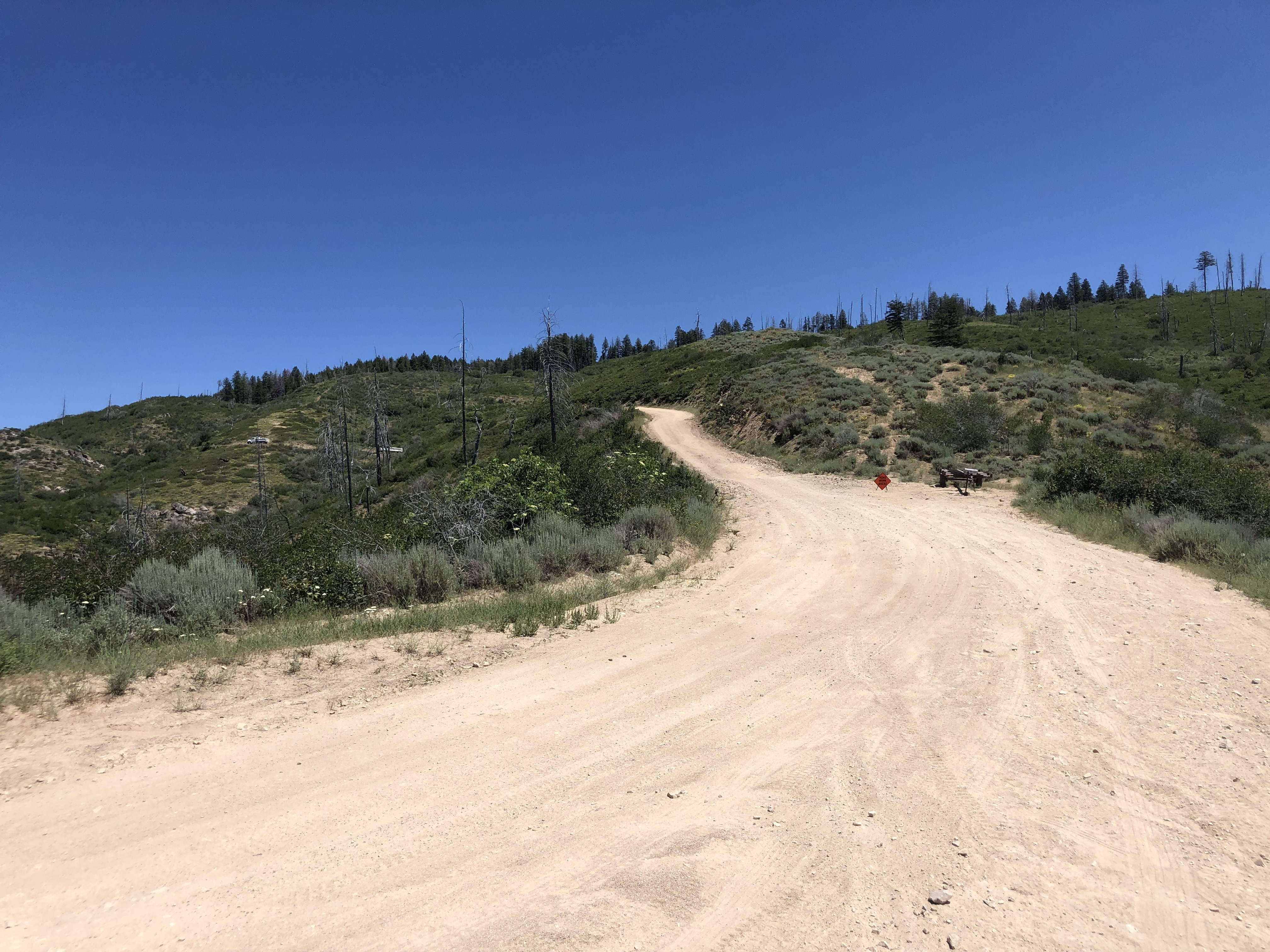 Boise Ridge Road
Boise Ridge Road
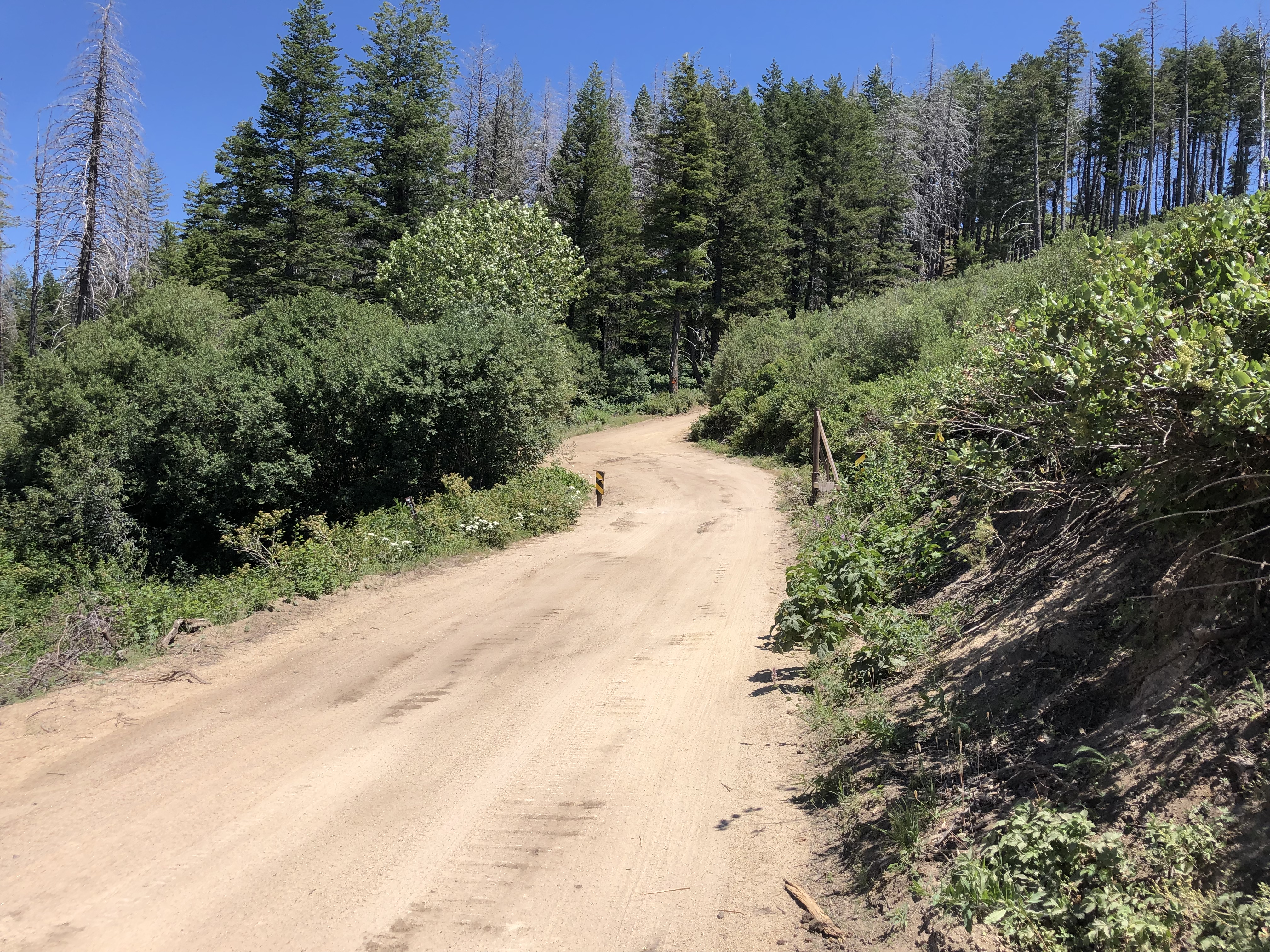 Boise Ridge Road (tree line)
Boise Ridge Road (tree line)
Aside from kicking my ass a bit, the ride up was nice and uneventful. Around mile 20 the gravel road intersected the “Around the Mountain” singletrack trail so I hopped on that for the last five miles or so. Overall A.T.M. is a pretty easy trail so I didn’t have too many issues with the loaded bike, but compared to a naked bike I could definitely tell the difference in both handling and climbing. I just took it easy and plodded along, thinking about the dinner I was going to maul once I got to camp.
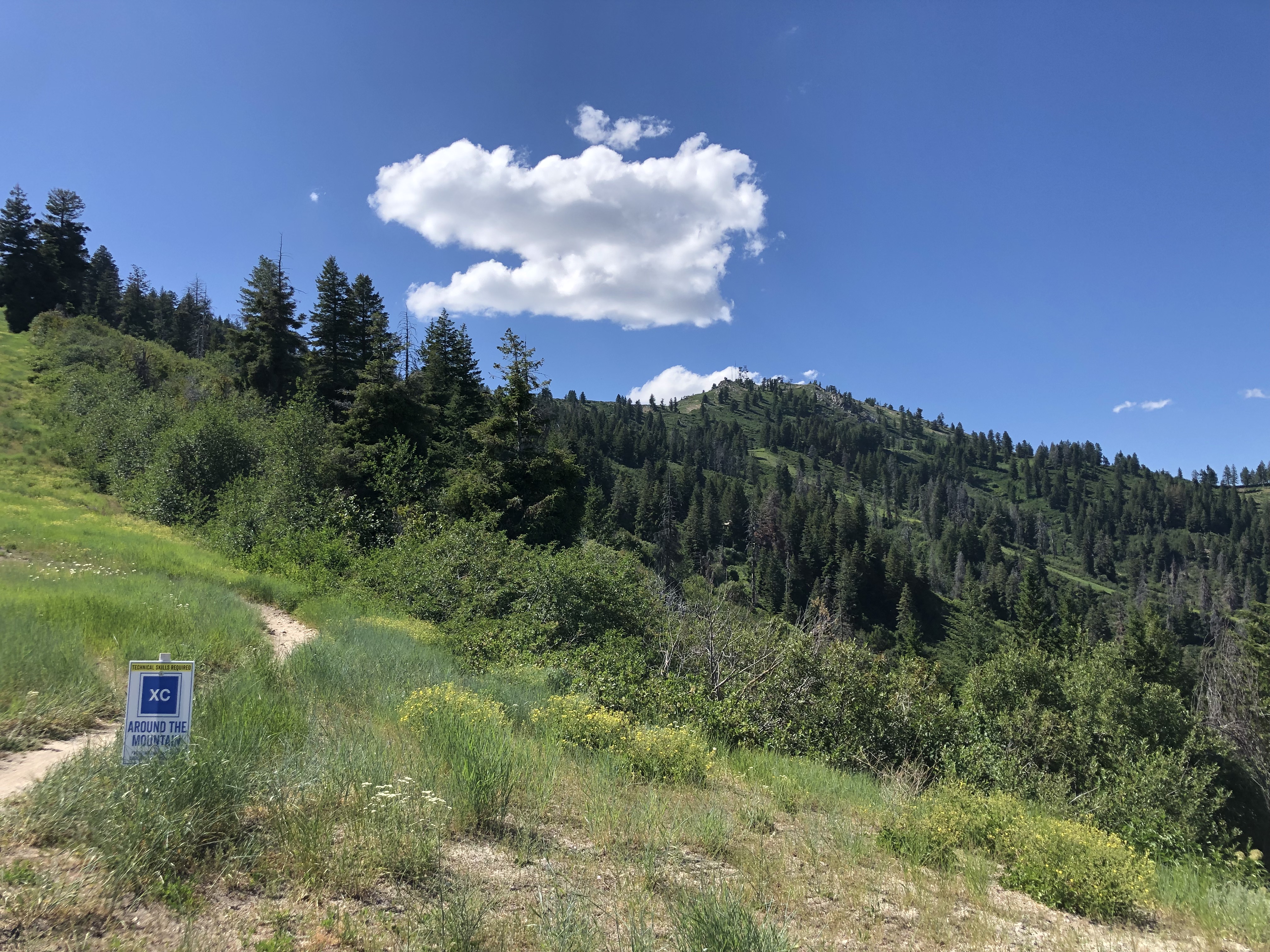 Around the Mountain MTB trail
Around the Mountain MTB trail
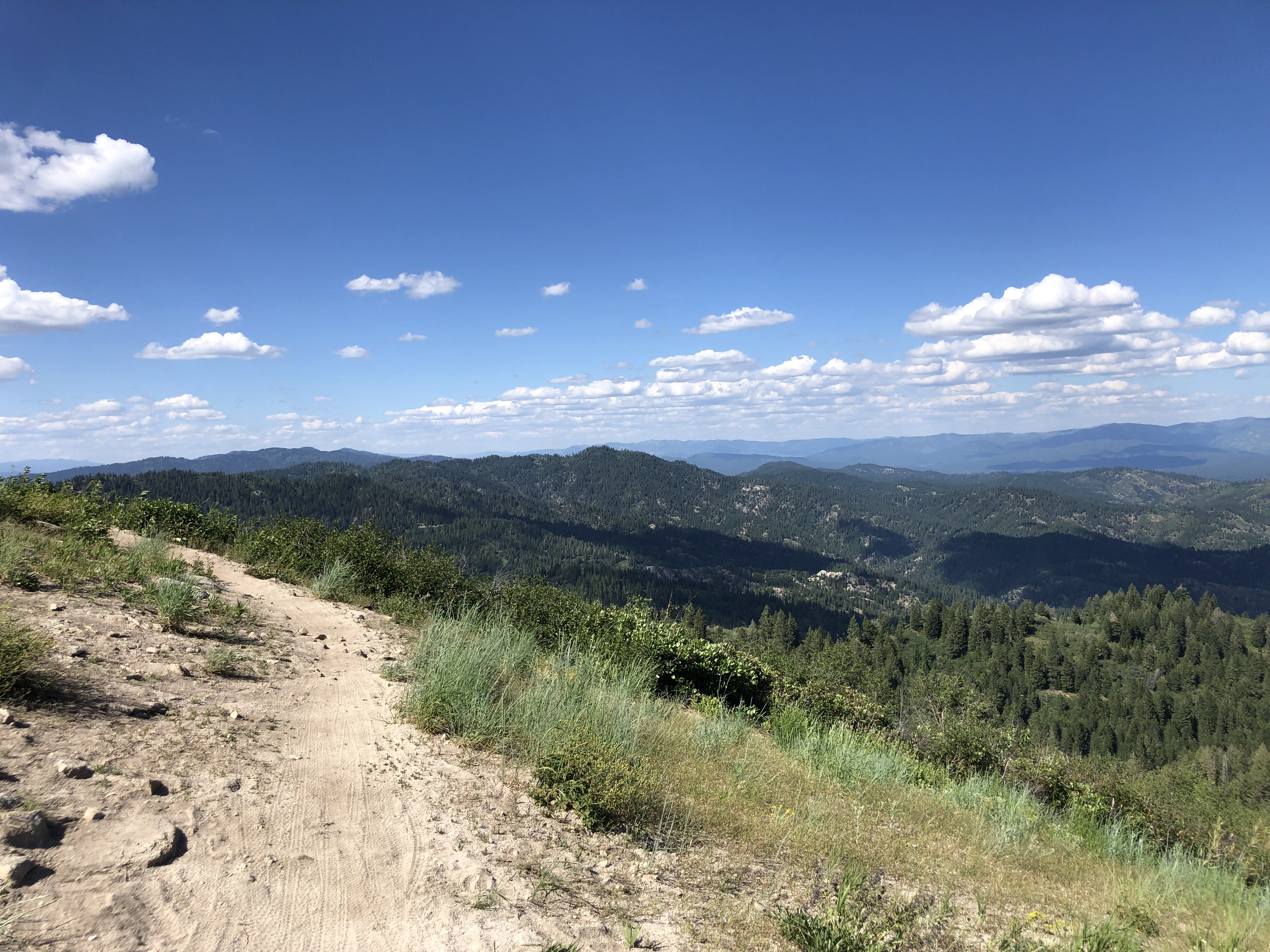 View from Around the Mountain
View from Around the Mountain
After nearly five hours of riding I made it to the Shafer Butte Campground. It was way busier than two weeks ago, but I was able to snag the same site, which is nicely tucked away from some of the other sites.
There’s kind of a hidden spring behind one of the camp sites so I was able to rinse off a little and filter some amazingly cold water. I got a new water filter a few days ago and am happy to report it worked really well. I’m always a bit “water anxious” so having a solid filter – especially when you’re limited on how much water you can carry – is key.
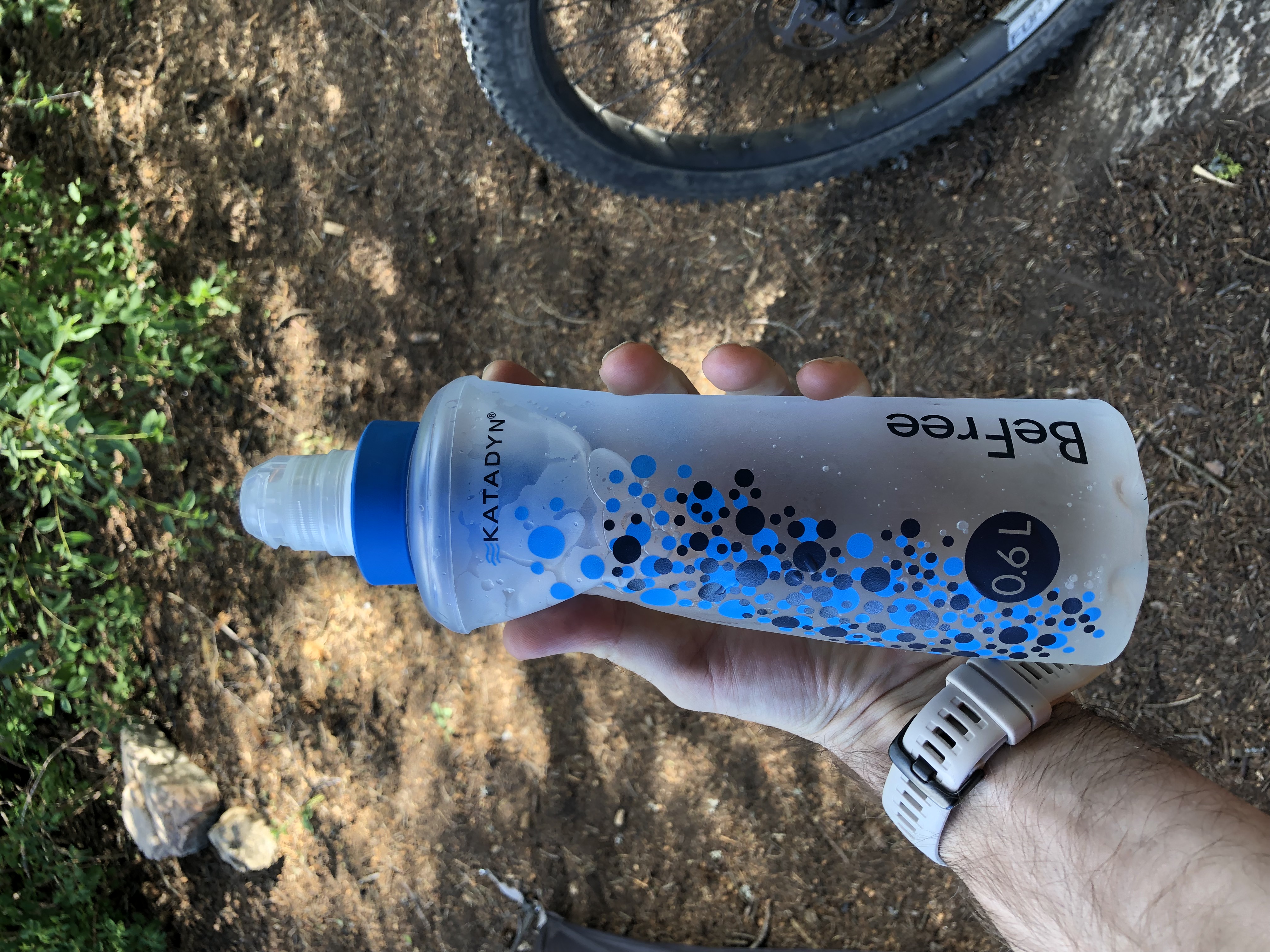 New water filter
New water filter
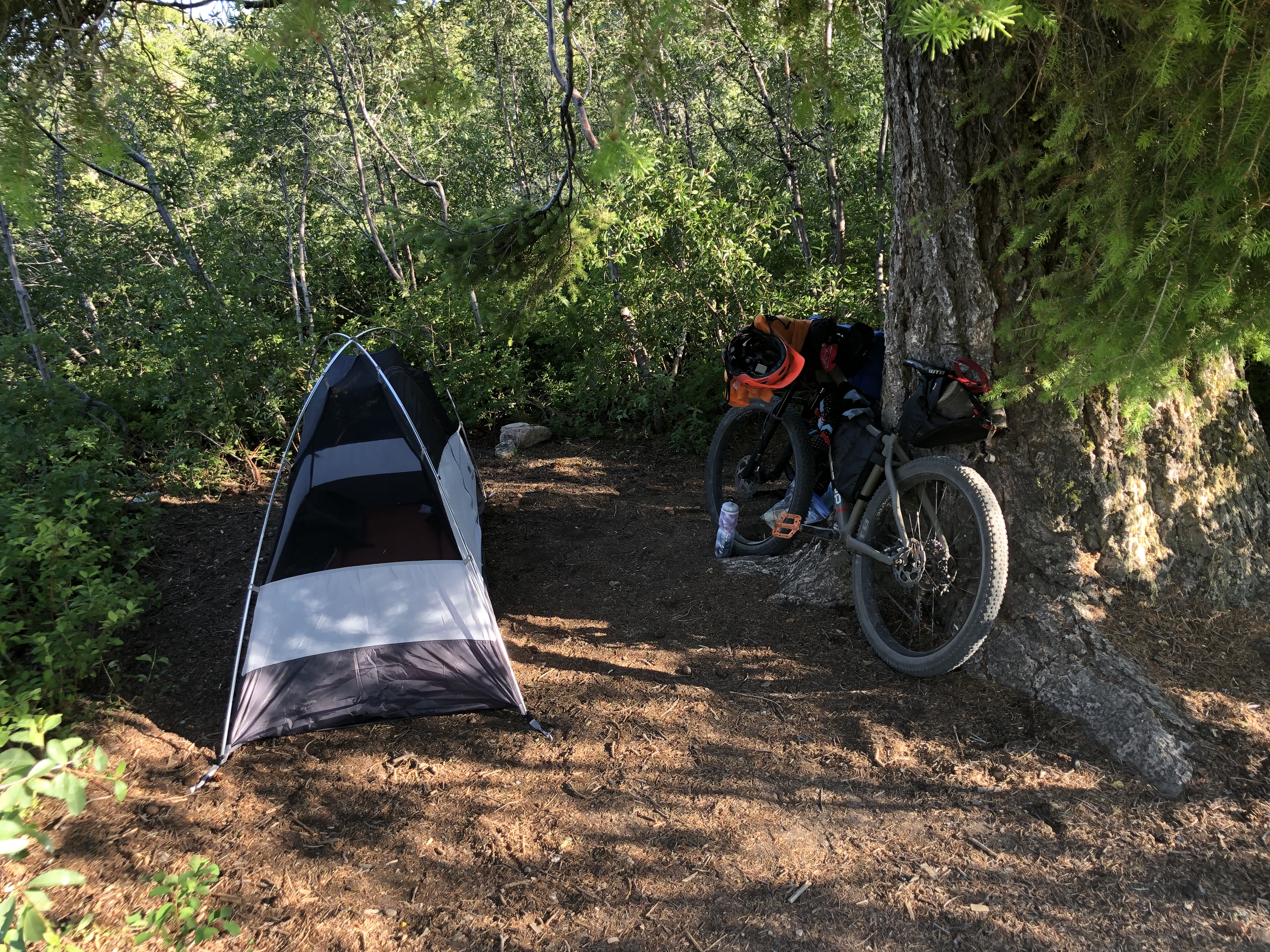 Camp
Camp
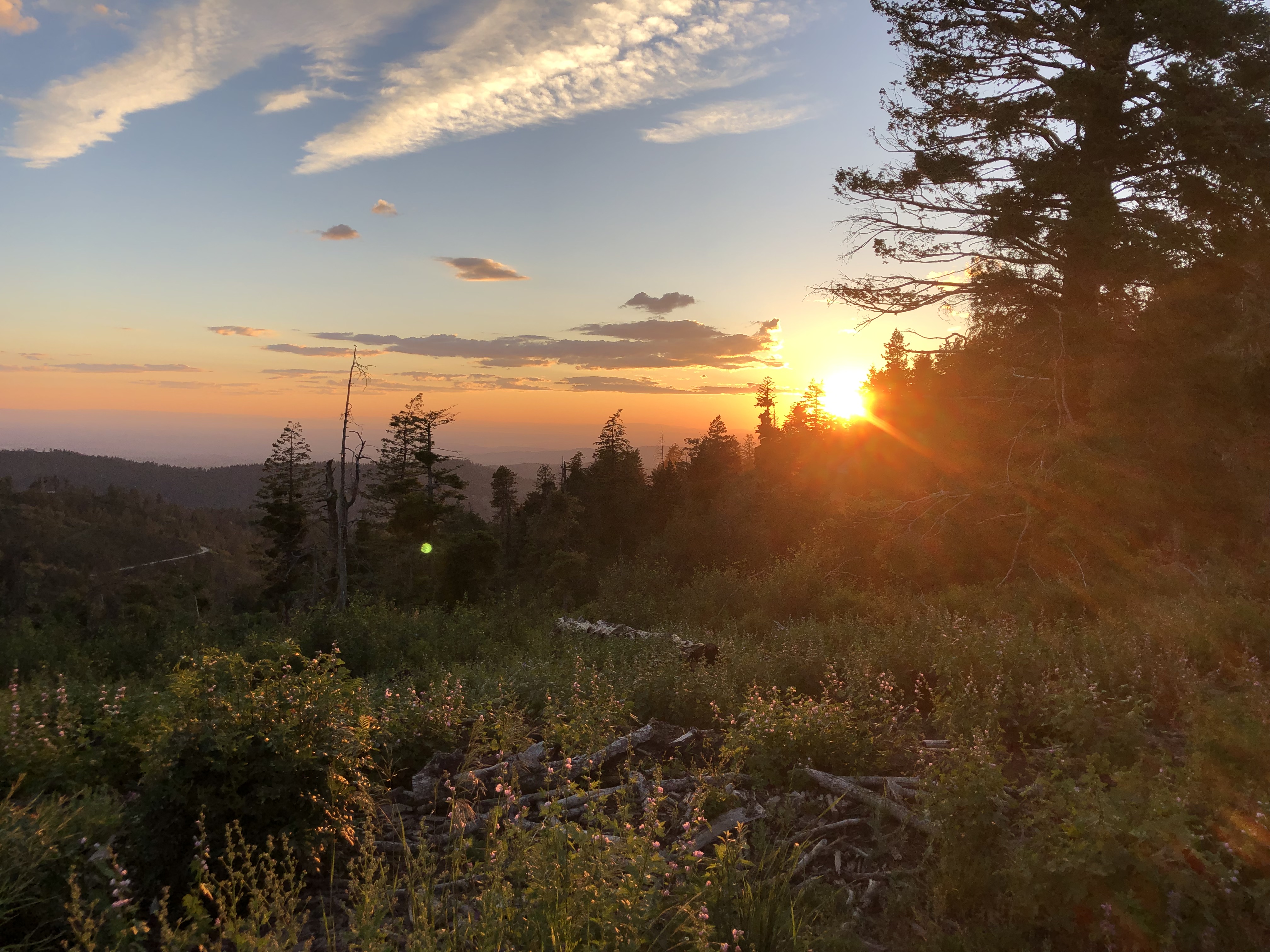 Sunset
Sunset
After setting up my tent, etc. I had dinner and just kind of hung out, enjoying the cool evening and the beautiful sunset. I got up early in the morning, packed up camp, had some coffee and a granola bar and headed for home. The ride home was only 1 hour and 26 minutes (compared to 4 hours and 45 minutes going up the mountain).
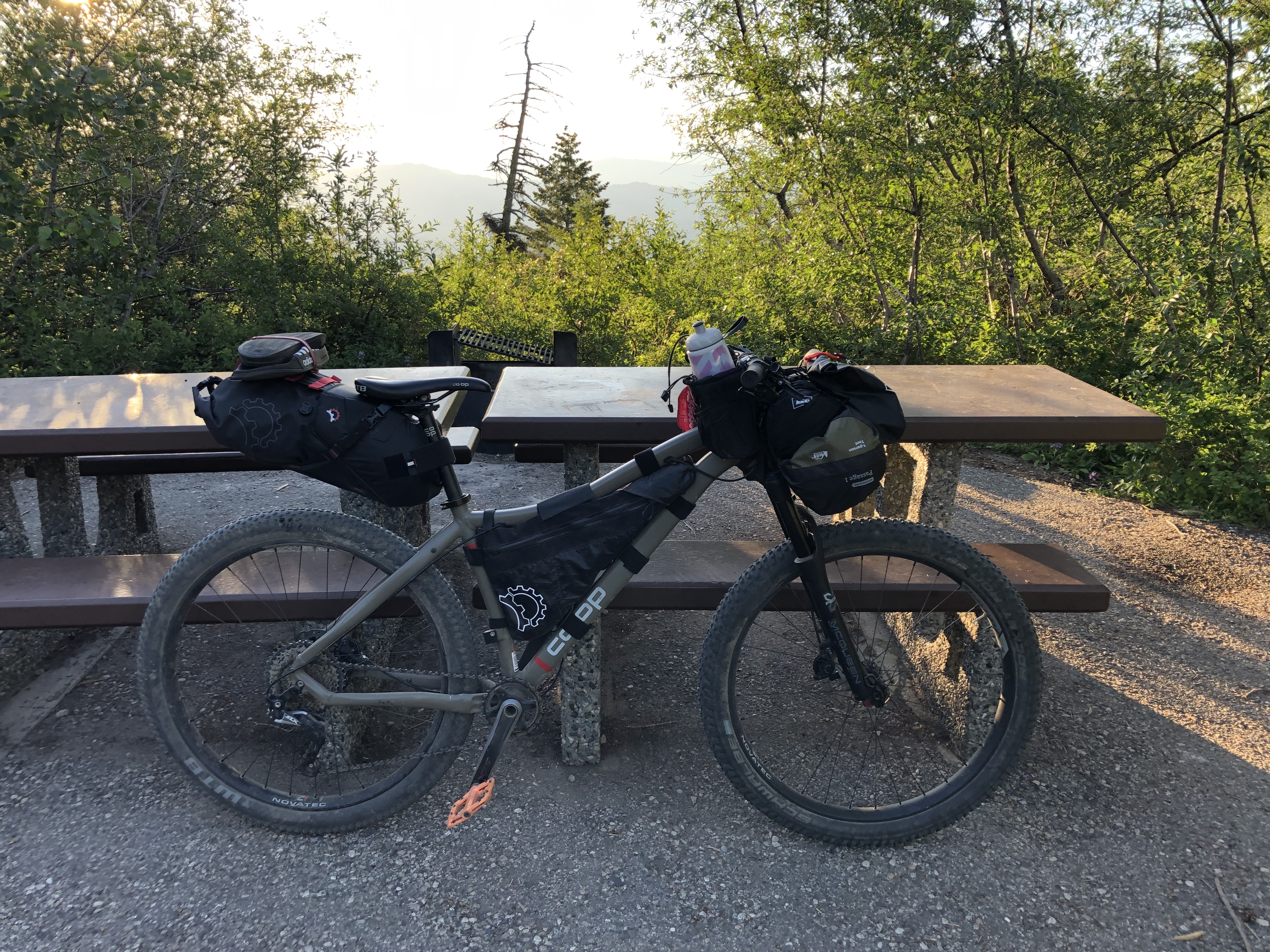 Ride
Ride
Another awesome little trip. A bit grueling for me on the way up, but I like the challenge and is one of the reasons why I like bikepacking. I mean, I could easily drive up and spend the night on the mountain. But the challenge and reward of riding up, along with the richer travel experience afforded by slow travel, is really why I do this stuff.
So what’s next? I’m not sure, but will hopefully be planning something soon.
Ride stats
- Total bike weight (bike + gear): 54.4 pounds
- Ride up: 24.51 miles, 4 hrs 45 mins, 5732 feet climbed
- Ride down: 24.46 miles, 1 hr 26 mins, 691 feet climbed
NASRS Season 16 Race 4 (COTA)
The NASRS season 16 race 4 was at COTA for the season’s wet race and it was, well, not great (at least for me). I was on the back foot from the get-go since I really didn’t know COTA that well and was having a hard time getting a setup that worked for the Lambo in the wet. I was also focused on some other projects, etc. so didn’t put in as much practice time as I should have. And the results for the race reflected all of that.
I won’t go through a detailed play-by-play for the race because 1) not all that much happened and 2) it’s too painful to recall my mistakes (ha!). But, here’s a quick summary.
I did the best I could in qualifying, but ended up P9, which isn’t great. Qualifying was especially tricky because the track was “greasy” instead of wet so we all ended up having to run dry tires. I didn’t really have a good setup for these conditions so the car was sketchy AF.
I lost a couple places at the start of the race (I was being really cautious in the wet), but settled in and did my best to just keep pace. I made a huge mistake 1/3 into the race and caused an accident (and got a 10 sec penalty as a result). I was battling someone for quite a few laps before we passed two cars that had spun. The car in front had to slow a lot more than I did so I thought I had more speed and was going to easily pass him in the corner. But, that didn’t happen and as I went wide out of the turn I nailed him. I ended up spinning out and thankfully he was able to continue without any issue. I thought I was off the track after the spin and continued rolling backwards so I could get turned around. However, in doing that I hit someone who was trying to skirt around me. It’s a big no-no to not hold your brakes after an incident so I was penalized for that. In my defense, I felt like I was off-track enough, but that’s the way it played out so no complaints from me. I shouldn’t have been in that position in the first place so my stupid error definitely deserved some kind of penalty.
I had 12+ seconds of damage and just did my best to finish the race with the pace I had. I ended up in P10, which wasn’t a very good result given the numbers in the field (only 17). But, I was off-pace here for sure so in reality that’s the result I deserved. Plus, the top-end of the split is so quick and competitive that it just illustrates if you aren’t on your game, you’re gonna quickly be down in the results.
I’m looking forward to Misano next week for the season’s night race. I know that track better so will hopefully have a more fun and less destructive race than this one.
Week 4 final results (COTA)
- Qualifying: P9/17
- Race: P10/17
Here are a few highlights from the race
Bike overnight - Shafer Butte
Weather permitting, I’m generally on a bike every few days, whether it’s a quick MTB or road ride or a trip on the greenbelt to get groceries. (Or even on the trainer three times a week in the winter, if that counts.) So even though I’m regularly on two wheels it’s been a while since I’ve done riding of any real substance. A month or more ago I started thinking about this a lot and realized I’m getting a bit complacent and really missed riding big, tough rides. I mean, I used to ride 100-150 miles a week and now 150 miles a month would be, well, a lot. I wanted to fix this and figured some bikepacking trips would be a good way to right the ship.
Consequently, I’ve been trying to get out a bit more recently and get back some sort of riding fitness. This has been a little tricky because my main (i.e., only) riding partner is my wife, Heidi, and she’s currently having some hip/back issues that are preventing her from riding anything that’s too intense and/or longer than an hour. So if I was going to start doing some bikepacking trips, I was on my own. Thankfully my wife is supportive of really any solo trips I want to take (she is probably looking forward to some time alone!).
I’ve done an exploratory ride on a potential local bikepacking route and did a couple training rides in the foothills. We were on a short camping trip last week and I was riffing with Heidi about some bikepacking trips I’d like to do. We both came to the conclusion that it was probably better to just dive in and start doing them rather than spend a bunch of time trying to get back into riding shape, which, truth be told, probably wouldn’t work anyway. So I decided to jump right in and head up to Shafer Butte on Thursday and spend the night.
We had done this same overnight trip in 2021 and it was kind of brutal. At a couple points near the start of the climb, I felt like my bike was too heavy and I just didn’t have the fitness to make it up the mountain. The ride up to the campground is 24.5 miles and has a little over 4800 feet of elevation gain. I am definitely in worse riding shape than I was in 2021 so I was steeling myself for another nightmarish slog. But, the nice thing about a solo ride is you can go your own pace without (much) guilt so I was just going to take it slow and grind it out.
My trusty Surly Long Haul Trucker weighs about 39 pounds without any bags/gear. There’s no water at the campground so I needed to bring all the water I needed. All loaded up my bike + gear weighed in at about 70 pounds. I’ll probably write more on this later because 30 pounds of stuff seems kind of ridiculous, but I don’t really feel like I brought more than a tent, sleeping bag, sleeping pad, some food, and post-ride clothes. Anyway, the bike was heavy.
I left our house around 3:00pm and after three or so miles started the ascent up Bogus Basin Road. The temperature was high 80s/low 90s, which isn’t all that warm for Boise this time of year, but it was one of the hotter days we’ve had so far this spring/summer. As expected, I struggled a bit on the ride. A bit? Uh, more like “A lot.” But, I kept pedaling, telling myself it was going to be better once I got up into the trees and things cooled down.
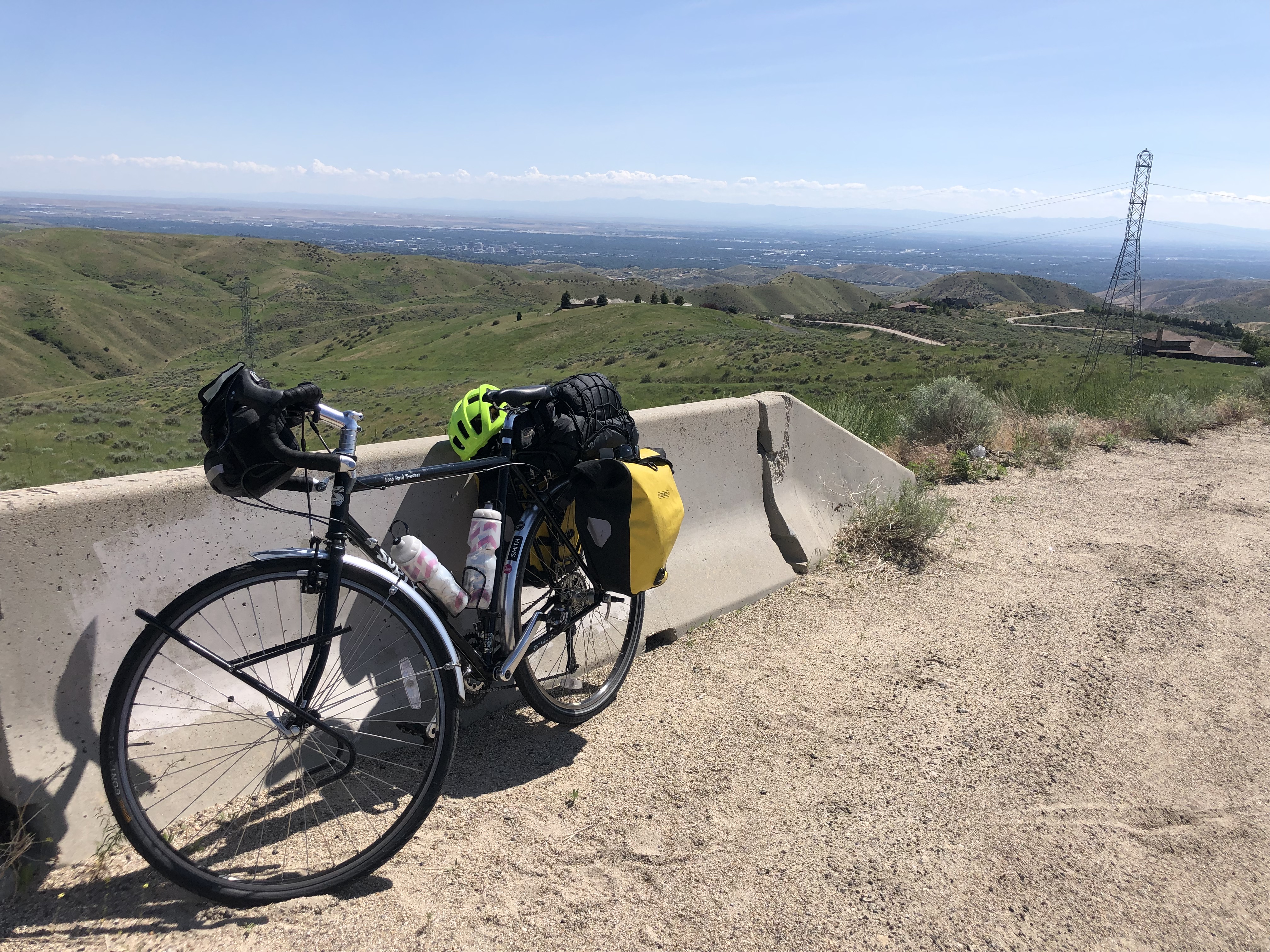 1/3 of the way up
1/3 of the way up
And it was better. I reached the main Bogus ski lodge area after about three hours of pretty steady suffering. If we’re ever up at Bogus in the summer it’s usually really early in the morning so I don’t know if it’s like this every weekday afternoon, but on Thursday there were a ton of people mountain biking and hanging out, enjoying food and drinks. Which was all a nice surprise since I was able to find a Gatorade and rest for a few minutes.
After Bogus the road turns into a sandy gravel mix for the last five miles up to the Shafer Butte campground. Another slog, but not quite as dire as the paved road below since I now had cooler mountain air, abundant trees, and a less-blazing sun that was making its way down toward the horizon.
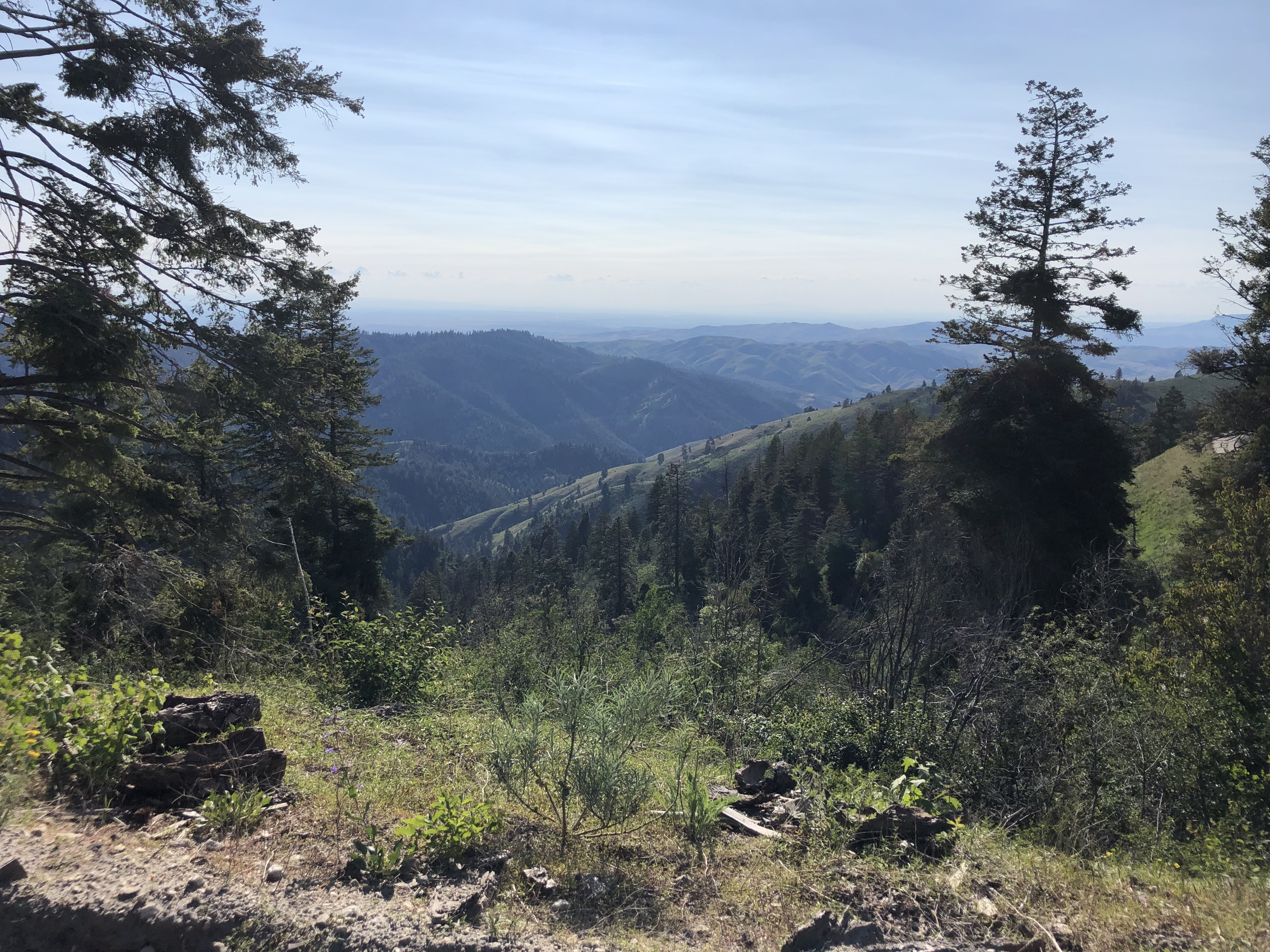 Views
Views
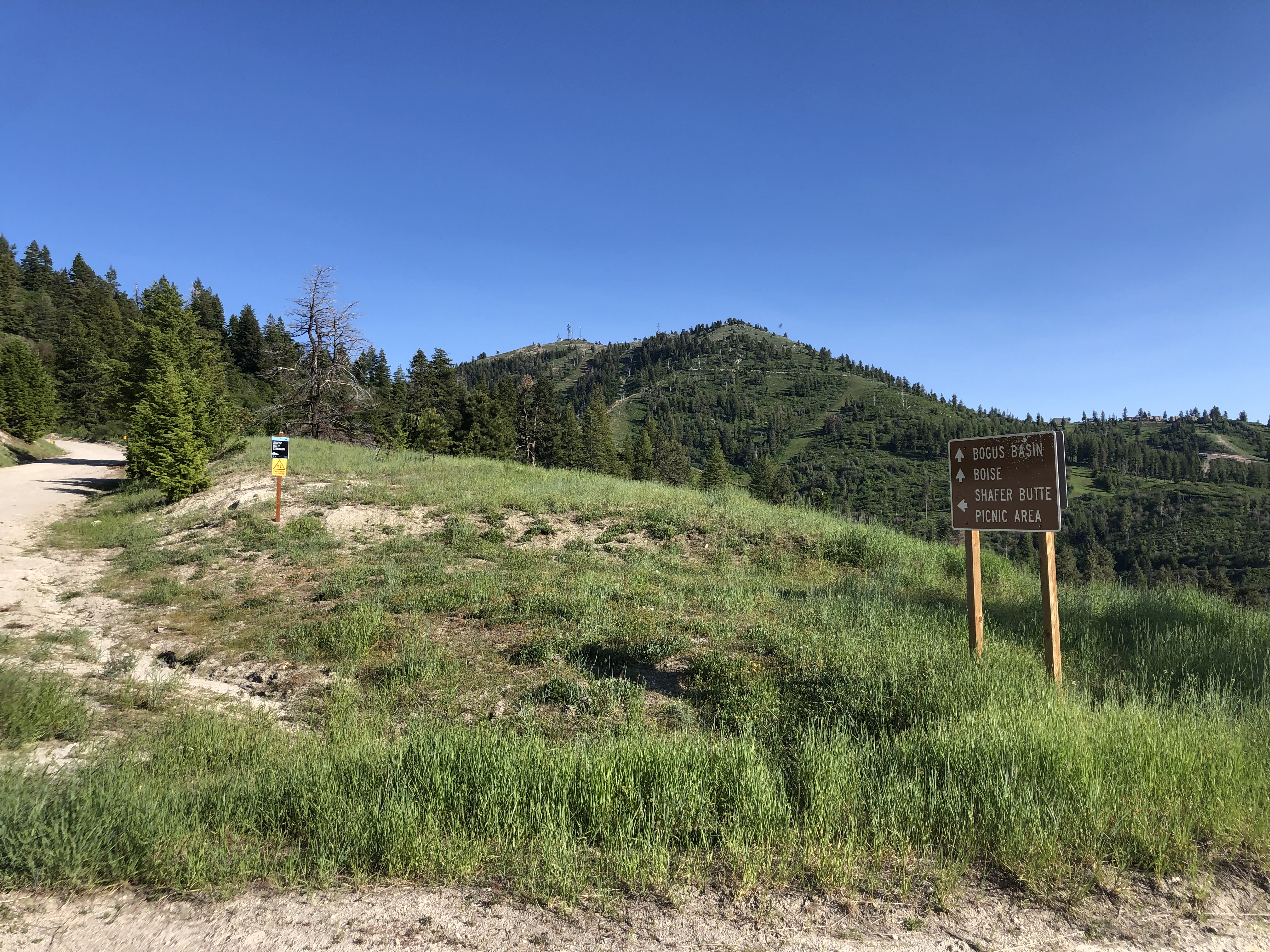 Almost there
Almost there
A little more than an hour after leaving the main Bogus lodge I made it to the campground, which is a small, tent-only affair that has some stunning views of the mountains and valleys. There was only one other site occupied and I was able to find a site tucked away in the trees. It was nice and quiet and, most importantly, had a really nice view.
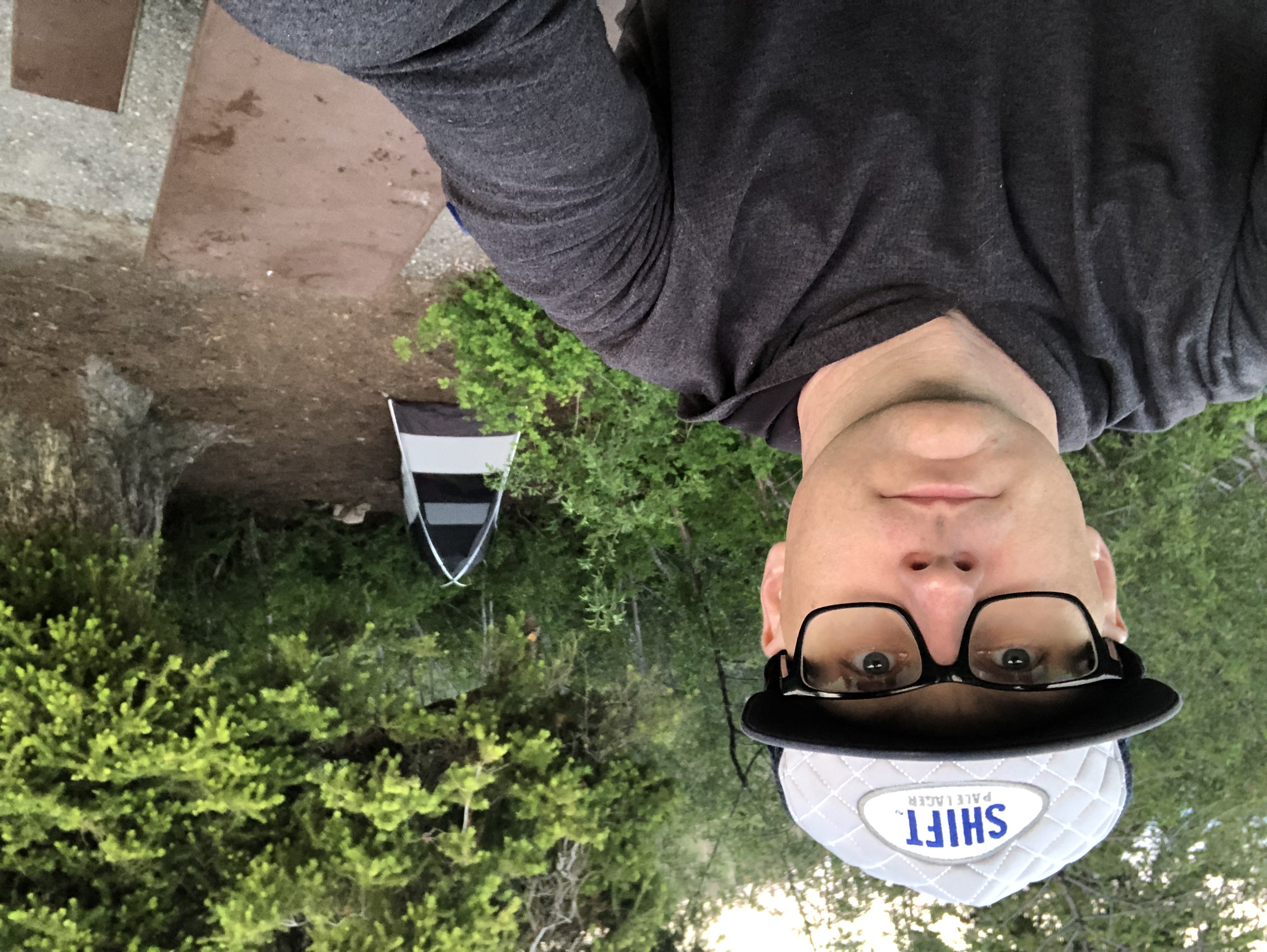 The author (and tent) :)
The author (and tent) :)
 View from campsite
View from campsite
I got my tent set up and had my meal – thai noodles with tofu and peanut sauce, which I made at home before I left. I always find that it doesn’t really matter what you have to eat after a tough ride and you’re on the verge of bonking since everything will taste good. This must have been one of those instances because the food was delicious.
After dinner I hung out a bit and simply enjoyed the views and mountain air. I was able to sleep without a rainfly on the tent so I had a full view of the starry sky from my sleeping bag.
I was up a bit before the actual sunrise, enjoyed a cup of coffee and the beautiful morning views, and started working on getting things packed up. The ride back to town was much easier and faster at 1 hour and 30 minutes.

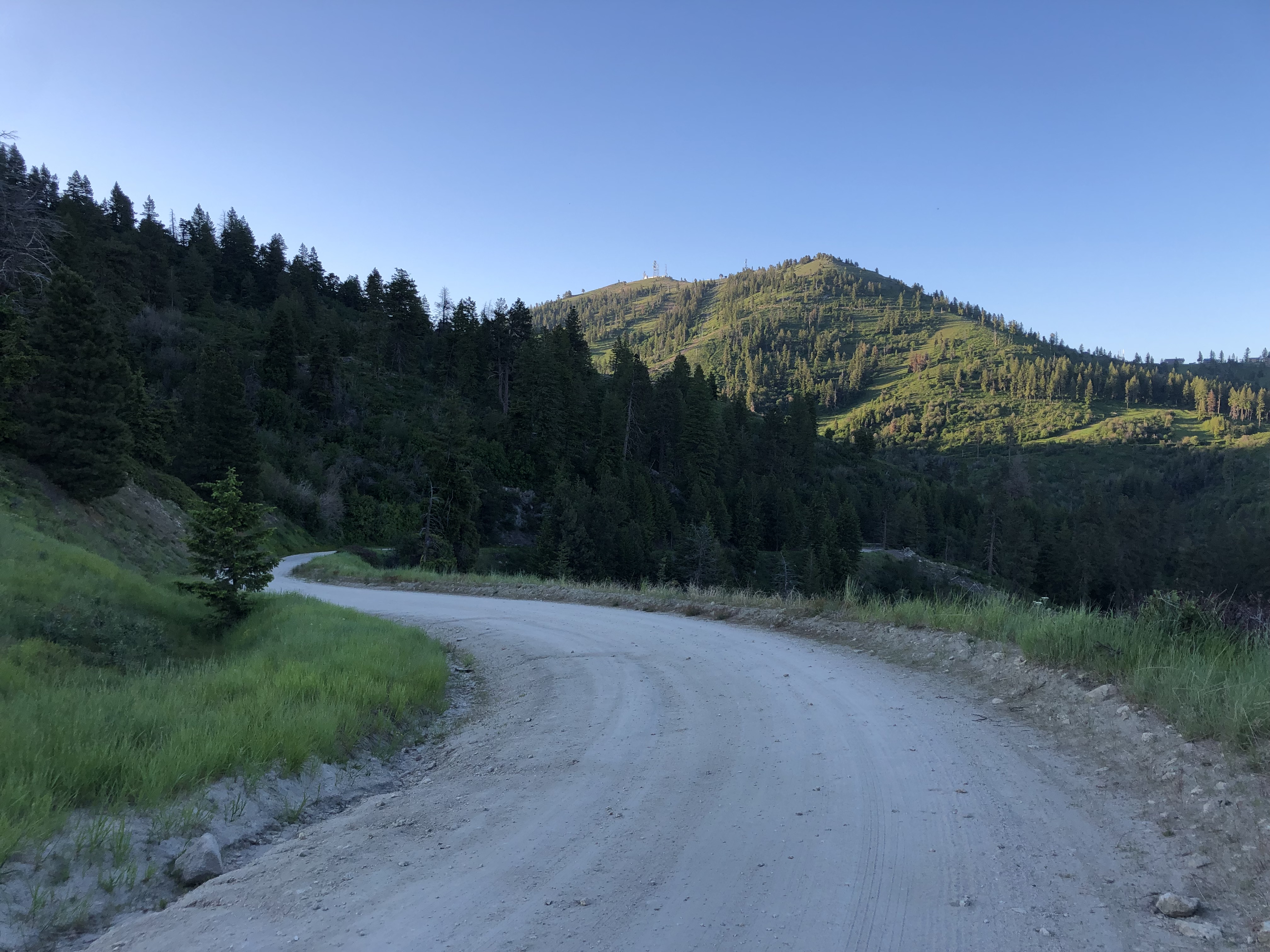 Riding home
Riding home
So, yeah, mission accomplished with this first outing. I felt tired, yet recharged when I got home and am already starting to plan my next adventure. I’ll probably go back up the mountain, but will load up the mountain bike this time and take the dirt route. Can’t wait!
Ride stats
- Total bike weight (bike + gear): 66.2 pounds
- Ride up: 24.41 miles, 4 hrs 9 mins, 4836 feet climbed
- Ride down: 24.88 miles, 1 hr 33 mins, 727 feet climbed
NASRS Season 16 Race 3 (Oulton Park)
Earlier this week the Wednesday split for NASRS season 16 was at Oulton Park for a 65 minute “highly changeable weather” race. I raced here with NASRS a couple seasons ago and generally wasn’t too crazy about the track. It’s really bumpy and very tight which also means it’s very difficult to make clean overtakes. But after practicing a bit for this race (and doing the race itself), I’ve moved into the “neutral” camp on Oulton Park. It requires a lot of precision re: car placement, which makes it a really challenging track that never gets boring. Plus, since mistakes are so easy to make it lends itself to interesting races that tend to shake up the usual pecking order.
The qualifying session was dry and I got lucky with a couple good laps and ended up in P3. There are a lot of really fast drivers in the Wednesday split and if everyone nailed a lap and hit their potential I’d probably be in the P6-P8 range. So this season I’m viewing anything better than P6 as a positive qualifying session.
I was a little bit out of position at the start, but had a good T1 and held my spot. I had a minor door bang with P4, but it was a racing incident so no harm, no foul. I settled into P3 and watched the two lead cars stretch their legs and get a comfortable lead. I knew I didn’t have the pace to compete with them so I was just trying my best to run clean laps and hold off P4, which I did for most of the first stint.
Right before the race started the weather forecast changed to “rain in 30” so we all were expecting rain, we just didn’t know how long it would last. After about 12 minutes the forecast changed to partly cloudy so that gave us our answer. I figured as long as the outlook stayed dry I would just stay on slicks and gut out the 12+ minutes. Then I’d change to new slicks during the mandatory pit stop and maybe increase the PSI a bit in order to account for the colder track surface.
So it was no surprise when it started raining on lap 16. I was still in P3 and was doing an OK job of holding my own. But the guy in P4 is a fast, solid driver who was also in an Aston Martin, which is great in the rain. Consequently, he was starting to catch up while I was beginning to struggle in the wet conditions.
I made my first big mistake of the race on lap 21 when a lapse of focus made me miss my braking marker, causing me to run wide on T4 (Island Bend). Most of the time when this happens you lose control of your car and end up slamming into the wall. Thankfully I was able to nurse my car back onto the track and only lost one position. However, P5 was right on my tail. And, unfortunately, that mistake wasn’t my last of the lap. I ran a little wide on the exit of T12 and almost spun out on the wet curb. So, one more place lost there, which put me into P5. I needed to go a few laps deeper before I made my pit stop so I hung on for dear life and tried to keep the car on the track.
I boxed on lap 24 and had a good stop, taking on fuel and new slick tires. (The rain had stopped at this point.) When I came out of the pits I was in P6, but P5 spun out later in the lap so I picked up a place there.
At this point I was about 3.5 seconds behind P4, who is a very fast and consistent driver. I was also about 7 seconds ahead of P6 so I was kind of figuring that this would be how things ended. However, I got a bit lucky as P4 made a mistake, went off track, and hit the wall. So I got a freebie and moved into P4. I was able to make up quite a bit of time on P3, but ran out of laps and finished the race in that position.
Overall I’m pretty happy with how things went. It’s always nice to have a race where you don’t make major mistakes (crashes, spins, etc.) and I had two of them this race. So, yeah, that’s a bit of a bummer. But, it’s a tough track and we had tricky conditions so landing P4 seems like a win to me.
We’re on a break next week (July 4th holiday) and are at COTA for a wet race the following week. I’ve never really raced at COTA and don’t know the track well at all so I’ll have some work to do to get ready.
Week 3 final results (Oulton Park)
- Qualifying: P3/18
- Race: P4/18
Here are a few highlights from the race
NASRS Season 16 Race 2 (Valencia)
A couple nights ago the NASRS season 16 Wednesday night split was at Valencia for another 65 minute race. A couple of the fast guys were out for the week (there are more absentees in the summer with vacations, etc.), but the field was still pretty stacked with fast drivers. I was hoping that if I had a couple lucky breaks I’d be able to get on the podium, but truthfully I would have been pleased with a top 5 finish given the strength of the field. I got lucky in qualifying and snagged P2, but the guys in P3 and P4 were faster than me so I was pretty sure I’d be moving backwards a bit. However, I was thankful to be on the front row since the first few corners at Valencia are tricky and there’s a high likelihood of incidents on the first lap.
I had a good start and made it through T1 without any issues. Right after the lights when green the game showed that P1 got a drive through penalty for being out of position, but the stewards removed it right away and said they’d review it. I was feeling like I was in a decent position for T2 but for some reason P1 swerved wide and nailed me, forcing me to go off-track. I lost a position and ended up in P3. P2 overtook the leader and those two quickly got out in front by a couple seconds. My strategy was to just settle in, stay as close as I could, and hope for one of them to make a mistake.
After a lap the stewards reported that the guy was indeed out of position at the start so they reinstated the penalty, which meant one of the fastest drivers on the grid was going to drop back a lot. Another really fast driver got hit from behind in T1 right at the start so fortune was in my favor during the first couple laps. I settled into P2 and did my best to hold off P3.
On lap 16 the leader misjudged a turn and spun out. He dropped back two places and I took the lead. P2 and P3 were then battling a bit and the previous leader overtook P2 and was right on my bumper on lap 23 as I pulled into the pits for the mandatory stop. I had a really good stop, but was preparing myself to get passed after I left the pits. Again, I was doing OK, but didn’t really have the pace the leader had. However, the leader, who boxed a lap after me, must have had a poor stop because both me and P2 passed him as he was exiting the pits.
So with about 30 minutes left in the race I was again in the lead with a 3.5 seconds advantage on P2. I didn’t think I had the overall pace to win so my only hope was that P2 and P3 would start battling and that would slow them both up. Which is pretty much what happened. I was able to keep pumping out decent laps (not terribly fast, but fairly clean and consistent) while P2 and P3 swapped positions a couple times, keeping them a few seconds behind me.
I got lucky and was able to hold off a charging P2 and got the win by about 4.5 seconds. This was my first “real” league win – I had won a rookie league race and a couple off-season races, but never a bona-fide league race. So needless to say I was pretty excited.
Week 2 final results (Valencia)
- Qualifying: P2/18
- Race: P1/18
Here are a few highlights from the race